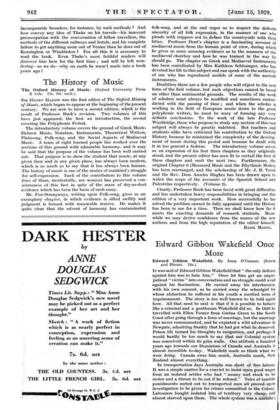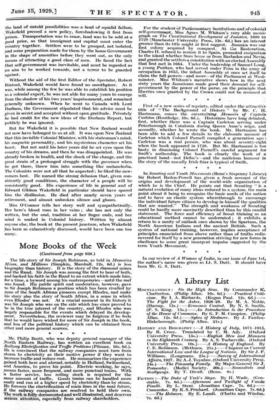Edward Gibbon Wakefield Once More
IT was said of Edward Gibbon Wakefield that " the only defence against him was to hate him." Once let him get an unpre- judiced " victim " into conversation and no struggle could avail against his fascination. He carried away his interlocutor, with his own consent, as he carried away the schoolgirl for whose abduction he suffered in his youth a merited term of imprisonment. The story is too well known to be told again here. All that need be said is that if it is possible to behave like a criminal and a gentleman Wakefield did. so. In 1826 he travelled with Ellen Turner from Gretna Green to the South Coast after going through a form of marriage, but the marriage was never consummated, and he expiated a wild adventure in Newgate, admitting frankly that he had got what he deserved. Prison life turned his thoughts to emigration, and perhaps it would hardly be too .much to say _that our Colonial system was conceived within its grim walls. Our attitude a hundred years ago towards our Dominions of Canada and Australia is almost incredible to-day. Wakefield made us think what we were doing. Canada owes him much, Australia much, New Zealand almost everything.
In transportation days Australia was short of free labour. It was a simple matter for a convict to,insist upon good wages
from an isolated settler who had " money and stock to be stolen and a throat to be cut if he refused." Tales of terrible punishments meted-out to transported -men all proved .upon investigation to be -given for crimes committed in-the-Colony. Labourers bought isolated bits of territory very cheap, and almost starved upon them. The whole system was a mistake the land of untold possibilities- was .a -land -of squalid failure. Wakefield pressed a new policy, foreshadowing it first from prison. Transportation was to cease, land was to be sold at a good price, so that immigrant and capital must enter the *country together. Settlers were to be grouped, not isolated, and some preparation made for them by the home Government in the shape of amenities before they went out, as the only means of attracting a good class of men. He faced the fact that self-government was inevitable, and must be regarded as an aim to be worked towards, not a terror to be guarded against.
Without the aid of the first Editor of the Spectator, Robert Rintoul, Wakefield would have found no mouthpiece. As it was, while among the few he was able to establish his position as a colonial expert, he was, not able for many years to emerge from the shadow of his two years' imprisonment, and remained generally unknown. When he went to Canada with Lord Durham, the Government stipulated that his advice must be given in secret and accepted without open gratitude. Privately
• he had credit for the new ideas of the Durham Report, but publicly he was ignored.
But for Wakefield it is possible that New Zealand would not now have belonged to us at all. It was upon New Zealand that this invisible Colonial Minister, with his statesman's mind. his magnetic personality, and his mysterious character set his heart. But not until his later years did he set eyes upon the country of his dreams, and then he was disappointed. He was already broken in health, and the shock of the change, and the great strain of ,a prolonged struggle with the governor when he got there, threw him into something like melancholia. The Colonists were not all that he expected ; he liked the new- comers best. He, nursed the strong delusion that, given con- sistently good conditions, the character of a people will be consistently. good. His experience of life in general and of Edward Gibbon Wakefield in particular should have spared him the • disillusion. He died after nearly seven years of retirement, and almost unbroken silence and gloom.
Miss O'Connor tells her story well and sympathetically. Her hero's blood runs in her veins ; she has not only the written, but the oral, tradition at her finger ends, and her mind is soaked in Colonial history. Written by almost anyone else, the book at the present juncture, when Wakefield has been so exhaustively discussed, would have been one too many.







































 Previous page
Previous page